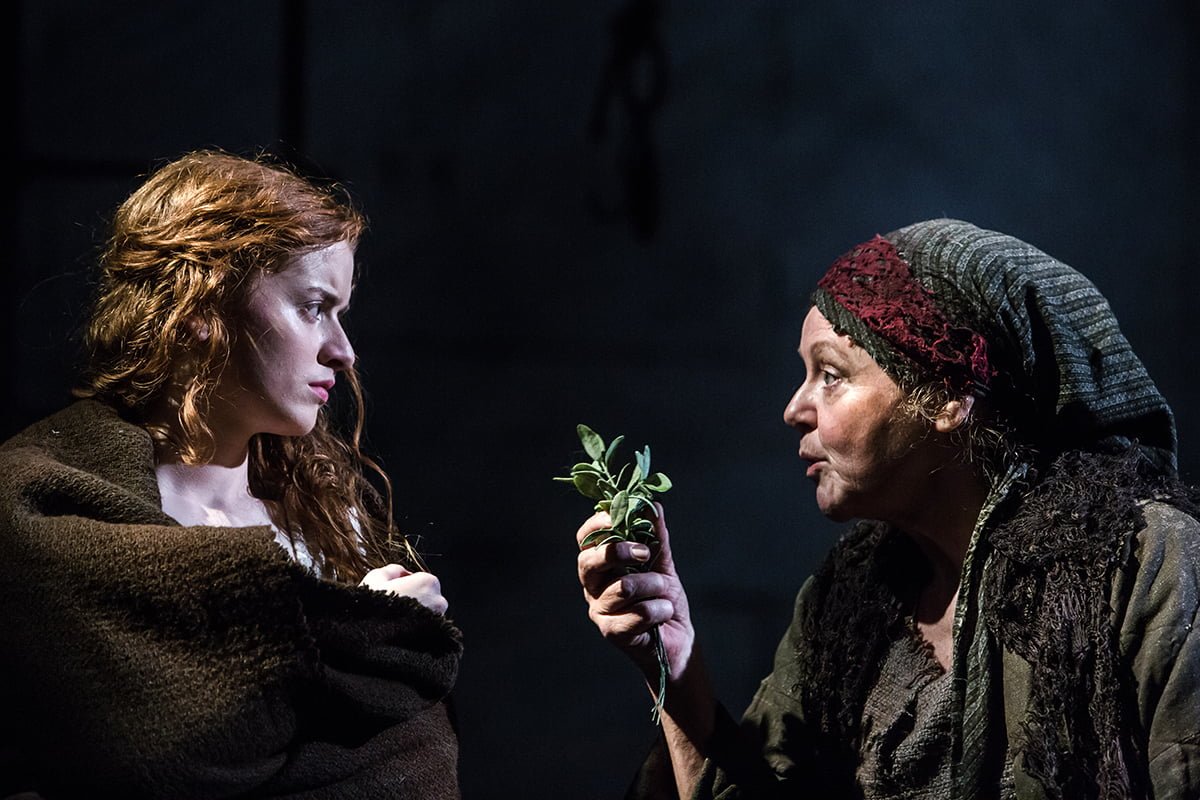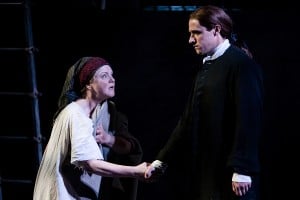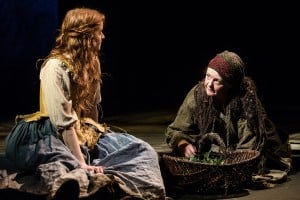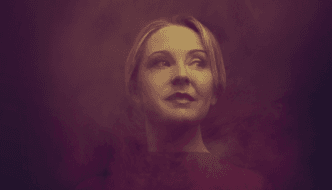Interview: Amanda Bellamy, star of Jane Wenham: The Witch of Walkern
October 21, 2015

Photo credit: Richard Davenport
TSOTA’s Rich Jevons talks to Amanda Bellamy before her performance in the title role of Rebecca Lenkiewicz’s Jane Wenham: The Witch of Walkern. Bellamy discusses witch-hunts, past and present, sex, nature and supernature, and looks at the oppression of women and the hypocrisy of established religion.
TSOTA: How has it been taking on the role?
AB: That’s an interesting one because I’ve stepped into this role fairly late in the rehearsal process. So actually there was a lot of quick, line-learning to do. The only thing that I’ve done which was harder than that was actually Happy Days BAC. For that I only had a two-week rehearsal period which is probably not enough for a play in which I talk solidly for an hour and forty-five minutes!
TSOTA: So you have been really thrown in at the deep end?
AB: Yes, I just had a call from my agent and I had an hour to make up my mind but actually it wasn’t a hard decision. There are so few good parts for older women and it’s a really interesting role and it just sounded like an interesting project. It was made a lot easier because other actors in the play were giving such amazing performances which made it a lot easier to step into it.

Photo credit: Richard Davenport
TSOTA: Does the audience actually feel sympathy for Jane Wenham?
AB: She is an older woman who is a bit of an outsider, she makes potions to help people in the village just to eke out a living with poultices and tinctures and things for some small payment and that’s how she lives. She doesn’t actually like to be very involved, she likes to live a solitary life. That’s something that in those days was seen as suspect. Women on their own who were not linked to a man are easy to make judgements against.
Even now, and that’s what’s interesting, society does make judgements against women who don’t conform. And it’s against older women in particular. It’s easy to see them as odd, a bit bonkers. She loves her animals and the people in the village make inferences about her sleeping with them.
There’s nothing very emotional about her, she’s almost like a Roma woman, though she actually was born in the village. She is very matter-of-fact, and down to earth, fiercely independent. So in that way she’s not the most sympathetic character but obviously what happens to her in the course of the play reflects exactly what happened to hundreds of women in a wave of witch-hunts in this country. 200,000 people were tried for witchcraft of which about 50,000 were actually executed. It’s a big part of our history which isn’t covered very much in plays. The only other play that you can think of is The Crucible but that’s set in America.
I hope that what happened to her does get some kind of sympathy from the audience. The audiences so far have been very wracked and silent. Rebecca [Lenkiewicz] has written quite a few laughs and it looks at a cross-section of a community. And some of the attitudes are so ludicrous as to be funny. But on the whole there is quite an intense atmosphere.
TSOTA: It’s known as the last major witch trial, do you think there was a change of thinking after this?
AB: There was. One of the characters in the play is called Hutchinson and he is based on a true person. He tries to talk sense to people about how ludicrous and cruel it was. So there was a change in those kind of ideas and they were largely discredited. There were a few trials after Jane Wenham which didn’t actually get a conviction.

Photo credit: Richard Davenport
TSOTA: How does it relate to our own times?
AB: It definitely is relevant to a contemporary world. Women are still persecuted for their difference or sexuality, whether it’s seen as ‘loose’ or being used. But it’s not black and white. There’s quite a lot of subtlety in the writing, they are very complex characters and as a counterpoint there are some strong women in it. You see the religious zealot but you also have got Bishop Hutchinson, who as I mentioned, has more liberal views.
The religious zealotry has got something to speak to today. That’s something that’s still some concern to our society. Also the way society treats women and especially older women, there is some truth even now in that. We haven’t completely got beyond that. There’s also the notion of how much we do or don’t accept difference in our society.
TSOTA: What can we expect in terms of James Button’s design?
AB: It’s a beautiful atmospheric design and it has to be very flexible because our tour is going partly to very small venues but also to some very large theatres as well. So it’s an extremely clever design but it also creates this cauldron of suspicion and superstition. It shows the very claustrophobic side of village communities where everybody takes interest in each other’s business. And there’s the grievances against each other that they take out on each other in various ways.
TSOTA: And how about the music and sound design by Max Poppenheim?
AB: It’s quite moody, evocative and poignant music and is sung beautifully by Cat Simmons.
TSOTA: And Matt Hutchins’ puppetry, I think this is a first for Out of Joint?
AB: No it’d be a spoiler. But I can tell you I have a close relationship with her cockerel!
TSOTA: What would you like people to take away with them from the show?
AB: I think a message about how we treat women in our society and also about tolerance of difference. And how extreme religious views can actually be very cruel, it can be an excuse to make judgements against people.
TSOTA: So do the witch hunts continue?
AB: The play is not making direct connections between what was happening in society then and now but you will come away thinking about women’s experience, especially in terms of sexuality.
Jane Wenham: The Witch of Walkern runs at Courtyard Theatre, West Yorkshire Playhouse, Leeds from 21 to 24 October. After that the run continues at the following theatres across the UK:
Tuesday 27- Saturday 31 October 2015, Liverpool Everyman Theatre (Book tickets)
Tuesday 3- Saturday 7 November 2015, Tobacco Factory Theatres, Bristol (Book tickets)
Tuesday 10- Saturday 14 November 2015, Salisbury Playhouse (Book tickets)
Tuesday 5- Saturday 30 January 2016, Arcola Theatre, London (Book tickets).
For information visit http://www.outofjoint.co.uk/production/jane-wenham-the-witch-of-walkern.




Comments